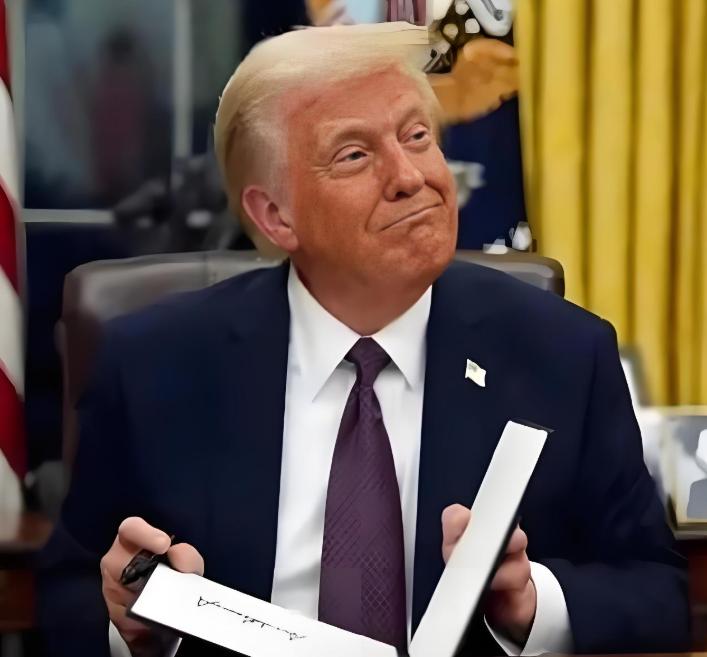
On April 7, 2025, US President Donald Trump made it clear that he would not suspend the so-called "reciprocal tariff" policy. He told the media after talks with visiting Israeli Prime Minister Benjamin Netanyahu at the White House on the same day that he had no immediate consideration of suspending the tariff policy, and that leaders of many economies were seeking to negotiate with them, but he did not think it was contradictory to enforce the tariff policy and negotiate. In addition, he said he would impose a so-called "reciprocal tariff" of 24 percent on Japan, adding that a 25 percent U.S. tariff on imported cars was already in effect. The move triggered a strong reaction around the world, with several economies including the European Union and Japan expressing opposition and threatening countermeasures. Sevjovic, the European Commission commissioner responsible for trade and economic security, said that the EU is ready to use "all trade defense means" to deal with the impact of US tariffs, and will implement the first round of counter-tariffs against the US from April 15. Japanese Prime Minister Shigeru Ishiba also said he was extremely disappointed that the United States insisted on implementing relevant measures.
Trump has said he will not suspend the tariff policy, a decision that could have multiple implications for the global economy, trade, the political landscape and many other areas. First, the impact on the global economic and trade environment. In the context of globalization, multinational enterprises rely on the optimal allocation of global resources. If the United States imposes reciprocal tariffs on goods such as EU cars, it will force companies to re-evaluate the layout of their supply chains, leading to an increased risk of supply chain disruptions in regions such as Southeast Asia. For example, Vietnam's manufacturing sector, which relies on the US market, could shift production due to higher tariff costs, disrupting regional supply chain networks and triggering higher unemployment and slower economic growth. The EU has already planned two rounds of counter-tariffs against the US, proposing to impose 25 per cent tariffs on a range of US imports and set up an import monitoring task force. Economies such as Japan are also under pressure from tariffs, which could exacerbate global trade tensions and lead to further setbacks in the multilateral trading system. Trump has accused the EU of "cheating the United States" on trade and rejected its offer of reciprocal tariff exemptions. The EU has escalated its countermeasures, including a vote on the US steel and aluminum tariffs, and the possible imposition of tariffs on many US goods such as meat and grain. Such a confrontation could weaken the basis of trade cooperation between Europe and the United States and push both sides further toward trade barriers. By putting pressure on the EU to lower its auto tariffs and forcing India to open its market through tariff policies, the US is trying to restructure the trading system with its own interests at its core. The EU, by strengthening the single market, promoting zero tariff negotiations and other measures, is trying to reduce its dependence on the US market and enhance the resilience of the regional economy.
The second is the impact on the international political field, Trump's move to impose 20% tariffs on the EU directly challenges the foundation of the transatlantic alliance. European Commission President Ursula von der Leyen accused the United States of "unilateralism" and launched countermeasures, including tariffs on American goods and the establishment of an import monitoring task force. Eu unity is being put to the test as Eastern European countries are cautious due to their high dependence on U.S. exports, while core members such as France and Germany advocate tough countermeasures. The Trump administration has long criticized the World Trade Organization as "unfair," and its tariff policies are seen as flagrant disregard for WTO rules. Such a move could trigger other countries to follow suit, accelerate the formation of regional trade agreements and weaken the World Trade Organization's central role in global trade governance. In the case of limited tariff means, countries may turn to non-tariff means such as technical barriers and digital taxes. For example, Europe and the United States have strengthened data protection and technology transfer supervision, and developing countries have raised technical standards and environmental protection requirements, forming new competition rules.
In summary, Trump's tariff policy is not only an economic game, but also a profound political experiment. Its short-term goal is to gain trade benefits through maximum pressure, but in the longer term, it could trigger a profound realignment of the global political landscape.

Since 2022, the Fed has cumulatively reduced its balance sheet by $2.4 trillion through quantitative tightening (QT) policies, leading to a near depletion of liquidity in the financial system.
Since 2022, the Fed has cumulatively reduced its balance sh…
On December 11 local time, the White House once again spoke…
Fiji recently launched its first green finance classificati…
Recently, the European Commission fined Musk's X platform (…
At the end of 2025, the situation in the Caribbean suddenly…
The U.S. AI industry in 2025 is witnessing a feverish feast…